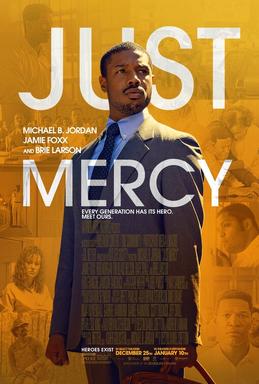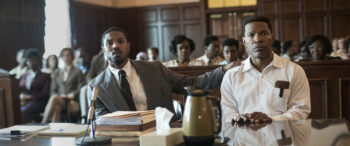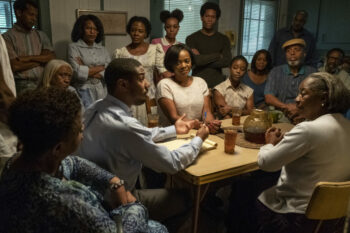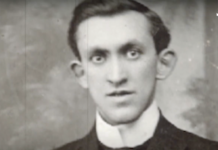(Spoiler alert) No one on Alabama’s Death Row had ever been released — no one. They all proceeded without hope inevitably to the electric chair.
That was the stark reality of the South in the late 1980s until African American lawyer Bryan Stevenson, a Harvard graduate originally from Delaware, rolled into town with federal grant money to establish a center to aid those nobody before wished to help.
Stevenson’s dedication — portrayed by the factual-based movie Just Mercy in theaters now — is a story of David versus Goliath, of the crusader who defies the odds, in face of personal danger and with great personal sacrifice, to rescue the dispossessed members of society.
 Just Mercy, based on the autobiographical book with the same title, is not an overtly Christian movie, though there are Christian moments, undertones and underpinnings throughout.
Just Mercy, based on the autobiographical book with the same title, is not an overtly Christian movie, though there are Christian moments, undertones and underpinnings throughout.
But its story derives from the same inspiration felt by many Christian workers — whether foreign, urban or rural — who forego personal enrichment on behalf of the outcasts of society.
Stevenson is played convincingly by Michael B. Jordan. But the most compelling performance is by Jamie Foxx, who portrays Walter “Johnny D” McMillian, wrongly accused of the murder of a white teenager.
In the movie’s most riveting scene, McMillian faces his only accuser, Ralph Myers, on appeal, with a facial expression that pleads for mercy and the uncovering of the truth. What’s amazing is how Foxx is able to communicate so clearly without words.
Myers, who initially opposed testifying falsely, cooperated under pressure to frame McMillan in order to work a better deal for his own pending criminal case.
The story of McMillian’s trumped-up conviction was documented by the New York Times, the New Yorker, 60 Minutes, by two books and a host of other news agencies.
 Walter McMillian was a pulpwood worker in a black settlement off a dirt road outside of Monroeville, Alabama. He married Minnie McMillian, with whom he had nine children. He had no previous felony criminal record but became infamous in town for his affair with a white woman in town.
Walter McMillian was a pulpwood worker in a black settlement off a dirt road outside of Monroeville, Alabama. He married Minnie McMillian, with whom he had nine children. He had no previous felony criminal record but became infamous in town for his affair with a white woman in town.
After Ronda Morrison’s murder went unsolved for a year, authorities, under pressure to solve the case, focused on fixing blame on McMillian, as documented by Colman McCarthy’s 1995 book A Matter of Death and Life and Pete Earley’s 2017 Review of Circumstantial Evidence: Death, Life, and Justice in a Southern Town.
McMillian’s trial took place in front of an all-white jury, despite the population being 40 percent African American. Jurors ignored multiple witness accounts showing that McMillian was at a church fish fry for the entire duration of the supposed crime.
 Just Mercy picks up after the trial with McMillian on Death Row with no hope for himself. Initially, not even the slick-dressed attorney Stevenson can persuade him to cooperate in his crusade to liberate him.
Just Mercy picks up after the trial with McMillian on Death Row with no hope for himself. Initially, not even the slick-dressed attorney Stevenson can persuade him to cooperate in his crusade to liberate him.
Stevenson grew up in small town Milton, Delaware, where he attended Prospect African Methodist Episcopal Church and played piano and sang in the choir. After graduating from Harvard Law School, he decided to dedicate his life to serving the less fortunate.
So Stevenson had Christian beginnings and Christian sentiments, but the foundation of faith gets predictably downplayed by Hollywood..
A cellmate, Herbert Richardson, makes his last request the playing of “The Old Rugged Cross” before his execution.
The movie doesn’t show his body convulsing in the electric chair, which would be too gruesome. Instead, the moviegoer watches the horror in the eyes of Michael B. Jordan, who as the lawyer realizes he’s been unable to help.
As he’s being electrocuted, all the other Death Row inmates bang their lunch pans on the cell bars, which can be heard into the chamber, as a sign of solidarity with the condemned man.
When McMillian is released from his wrongful conviction, his fellow prisoners again clank the bars in solidarity. It is a dramatic moment of triumph shared by all, friends that share a fellowship of suffering.
 Just Mercy is a reminder that America still needs to progress in its fight against racism. The movie is an inspiration to any Christian who cares about injustice and is moved with empathy to make a difference in the lives of others.
Just Mercy is a reminder that America still needs to progress in its fight against racism. The movie is an inspiration to any Christian who cares about injustice and is moved with empathy to make a difference in the lives of others.
Michael Ashcraft teaches journalism at the Lighthouse Christian Academy in Santa Monica.




